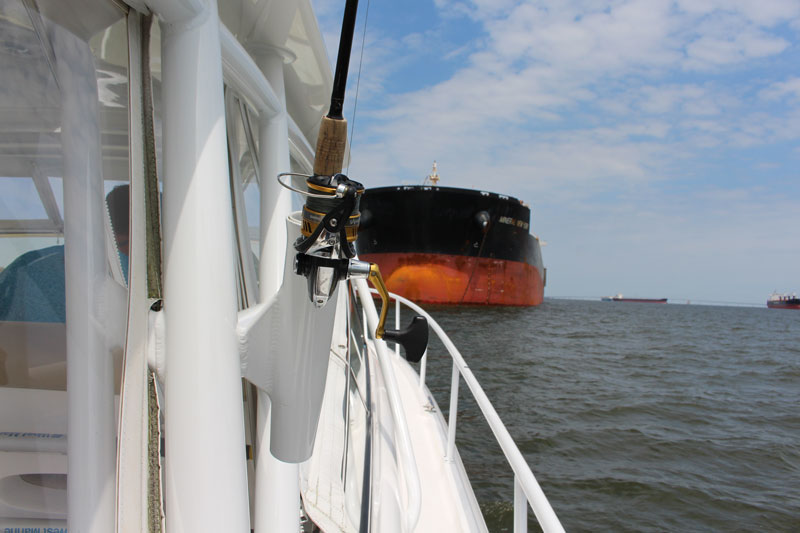Whether you go Chepaeake Bay fishing for striped bass up north near the Bay Bridge or down south out of Norfolk, Virginia, you’ve probably seen those monstrous ships anchored up, waiting to enter ports and deliver or pick up their cargo. When these ships sit at anchor, they create massive structures that attract fish every bit as effectively as rockpiles, drop-offs, and channels. Added bonus: On windy days you can often fish the leeward side of a ship and catch a break from the seas. In recent years stripers haven't hugged those ship hulls in tremendous numbers, but at different times through the years they've been a prime area to find fish. So, it's always worth checking them out on your way by.

The hulls of these ships may extend 30’ or even 40’ below the surface. The bulbous bows protrude beyond the visible waterline, adding structure that’s completely covered over the top with water. And of course, a propeller or two the size of your sportfishing boat is just below the surface astern. So there’s a lot of physical matter here that fish can orient to. But the obvious is only half the story.
By law, these ships are required to maintain floodlights illuminating the deck through all hours of darkness. These are potent lights, visible from many miles away. Plenty of that deck illumination spills over the sides of the ships—and that sucks in the fish. Find a ship that anchored in the morning, and fish around it in the evening. You’ll probably get a few hits. Return to that ship the next morning—after it’s been blasting light around it all night—and you’ll encounter 10 times as many fish. (Read Night Fishing for Striped Bass if you want to learn about how to take advantage of the night-bite, too). Some of the fish a ship attracts in the dark might move on once the sun comes up, but a large percentage stick around in the area to enjoy the physical structure. The longer a ship remains anchored in the same spot, the more fish it will suck in night after night and the more fish that will remain in the area through daylight.
Stripers will usually be located at mid-depth along the sides of the ships, with the best action often coming in the forward half of the hull. Weakfish, which used to be a common catch around the ships prior to their disappearance in the mid-2000s but now seem to be making a comeback, are more likely to be found at or near the bottom, and may appear on the meter anywhere around the ships, 360-degrees. For some reason, the sterns of the ships usually seem to hold fewer fish than the forward sections.

Jigging is commonly the best method for catching fish around the ships. Metal jigging spoons that will sink quickly and deeply and a good choice. Tandem rigs are perfect for fishing around the ships, too. Chartreuse and white are the usual colors of choice but occasionally pink is the hot bait and when it is, few other colors will work as well.
The next time you see one of those big ships at anchor, don’t motor on past quite so fast. Pull back the throttles, slide up alongside, and take a peek at the fishfinder. Because while that ship sits there at anchor waiting on his cargo, you might just fill the cooler with the type of cargo—the fish—that you’re looking for.
Editor's note: This article was originally published in May of 2017 and was last updated in June of 2024.